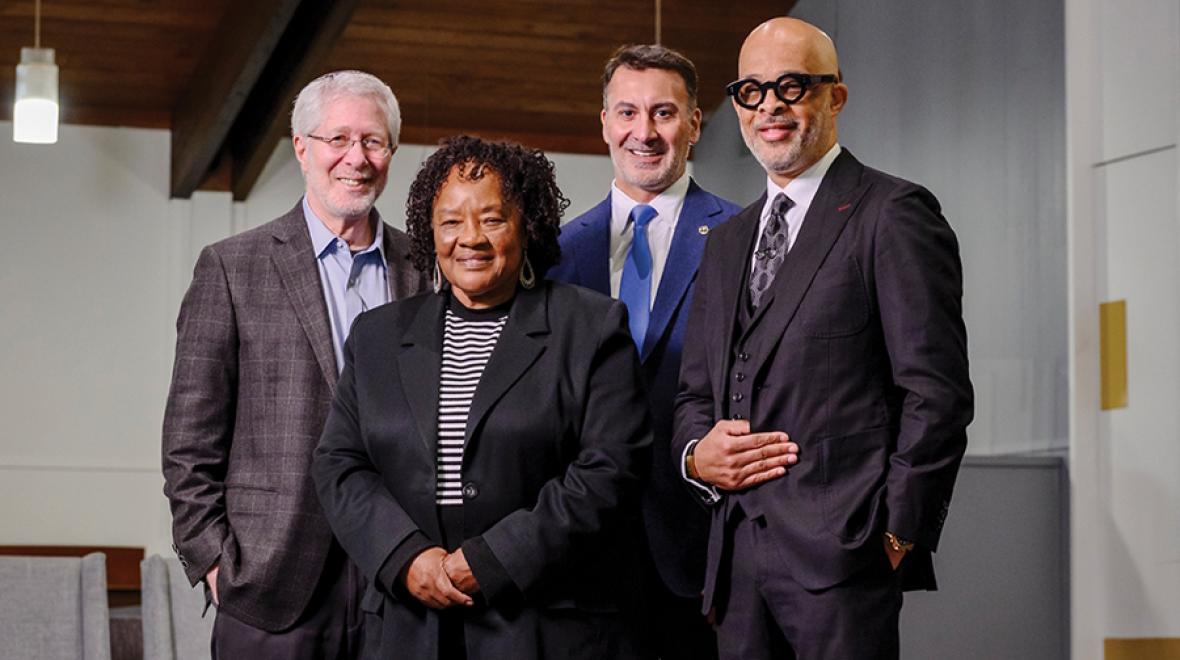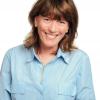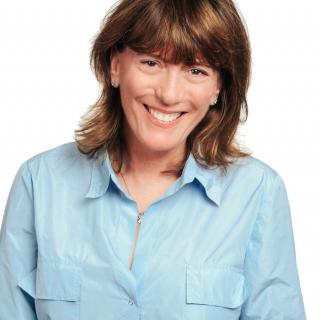
Photo:
Rabbi J. Rosenbaum, Rev. Linda Smith, Mayor Salim Nice and Bishop Garry L. Tyson. Photo credit: Will Austin
Blacks, Jews and Muslims share a history of overcoming adversity. Abraham’s sons were forebears of two great peoples: Ishmael of the Arabs, and Isaac of the Israelites, setting an ancient framework of love and tension. The biblical story of the exodus from Egypt has been a narrative that has inspired communities for centuries to pursue paths to freedom. Fast-forward to the Civil Rights Movement, when these diverse allies collaborated in the struggle to end racial segregation.
The drifting apart of these people over the years, rising antisemitism has called for renewed unity. The unrealized vision of the Rev. Martin Luther King Jr. inspired local Black, Jewish and Muslim leaders to join forces with renewed vigor, led by Rabbi J. Rosenbaum, Mercer Island Mayor Salim Nice, the Rev. Linda Smith and Bishop Garry Tyson.
Rabbi J. Rosenbaum
From a very early age, Rabbi J. Rosenbaum understood a profound aspect of Torah study: the challenge of discovering new insights within familiar texts. With each encounter, he wondered, “What can I possibly learn from this text?” and often found unexpected ideas emerging. Through years of study and reflection, Rosenbaum realized that connecting seemingly disparate ideas or texts mirrored the work of repairing the world. This philosophy guided his interactions, with him coming to believe that, just as unexpected connections could be found in Torah study, so too could they be discovered between people seemingly unable to be reconciled.
Rosenbaum has worked passionately and tirelessly for over six years in our community repairing seemingly irreconcilable relations between the Muslim, Black and Jewish communities. He shared a recent encounter with a young Muslim woman that exemplified this situation. Despite his discouragement with the situation in Israel and the response of the Muslim community, Rosenbaum was taken aback when the young woman expressed understanding and empathy for the Jewish perspective, stating, “I can really understand why the Jewish people would want their own state. As a Muslim, I can see the difference between being in a Muslim country and being a minority in another country.” Rosenbaum reflects, “I never expected this, and it blew me away. In 11 years of Muslim/Jewish dialogue, no one had ever said that before. You never know when that door is going to open, and exceed your expectations or you’ll exceed theirs.”
Together with Mark R. Jones, Ph.D., Rosenbaum cofounded Building Black and Jewish Beloved Community, using developed strategies to create coalitions between cultural groups, such as Black and Jewish communities, and immigrant and native populations. Their partnership exemplifies Rosenbaum’s belief in being open to unexpected connections and continually seeking ways for people to come together, even in the face of apparent division.
Mayor Salim Nice
In the tranquil landscape of Mercer Island, Nice stands as a guardian of unity and resilience in this idyllic community. His journey into public service was not merely a career choice, but a testament to his unwavering dedication to his hometown. Unprecedented growth and change ignited Nice’s resolve to act, to champion the needs of Mercer Island and its residents.
In the face of horrific acts of antisemitism casting a shadow locally and worldwide, the turmoil in Israel gripping hearts across the globe, Nice stood firm in his advocacy for Mercer Island's Jewish residents and neighbors. He and Deputy Mayor Dave Rosenbaum (son of superhero J. Rosenbaum) stood together to call on the community to support Jewish neighbors, emphasizing the importance of maintaining unity and safety for everyone on Mercer Island. Nice’s actions spoke volumes, demonstrating that in times of darkness, the light of compassion could shine the brightest.
Nice, the first Ismaili mayor in the U.S., offers simple yet profound advice: Ask questions. In a world fraught with division and discord, he believes that understanding is the key to building bridges, fostering compromise and, ultimately, creating a better world.
Rev. Linda Smith
Inspired by the impactful racial justice work of Rabbi Abraham Joshua Heschel and King, the Rev. Linda Smith embarked on a journey to delve deeper into the Jewish community's plight, recognizing the importance of unity in the face of rising hate and antisemitism. Smith is motivated by the belief that every person deserves to live free from fear, and her work is fueled by a passion for justice and a commitment to building relationships across the country.
Embracing theological differences, Smith finds common ground around the table, where conversations of justice and love flourish, leaving all participants feeling validated as human beings deserving of a life of freedom and equality.
Central to Smith’s mission is dispelling false assumptions and perceptions, and promoting a message of justice, peace and unity. She envisions progress and success as communities validating each other’s humanity, honoring individual authenticity, and standing together against racism and antisemitism. Smith encourages ParentMap readers to open dialogue about racism and hate, urging them to promote love among all races, cultures and ethnicities.
In her daily life, Smith finds solace in gratitude, reminding herself to be thankful for who she is and finding reasons to be grateful for those different from herself. With hope and justice as her guiding touchstones, Smith continues to inspire and empower others to join her in the noble pursuit of building bridges of understanding and love in a world too often divided by fear.
Bishop Garry L. Tyson
In 1963, written in the confines of a Birmingham jail cell, King’s words ignited a flame within Goodwill Baptist Bishop Garry Tyson. Inspired by King’s call for positive peace and social justice, he embarked on a mission to cultivate unity and dialogue across religious lines. Motivated by the biblical promise of blessings in unity (Psalms 133:3), Tyson tirelessly fosters an environment of harmony, believing it to be his divine calling as a Baptist minister.
His hope is simple yet profound: that people understand the transformative power of coming together in sacred spaces, transcending religious divides. The irony of his church's history, purchasing land from a Jewish synagogue only to later host Jewish rabbis, fills him with hope for a future marked by inclusivity.
For Tyson, progress is measured in the growing participation of African American pastors and congregants in the movement toward unity. Unity at this time means standing up to combat antisemitism with our Jewish brothers and sisters. His guiding principle: mission — nothing more, nothing less.
Encouraging ParentMap readers to take action, Tyson invites all to join their community Bible study, accessible via Zoom. He hopes to see more laypeople from both synagogues and Christian churches engage in the journey toward unity and understanding.
What book or podcast are you recommending right now?Nice: I highly recommend “Incredible Years: A Trouble-Shooting Guide for Parents of Children Aged 2–8 Years” by Carolyn Webster-Stratton. It’s been instrumental in guiding my journey as a parent since my son was 3. The insights from the book, coupled with attending “Incredible Years” classes, have equipped us with a solid parenting foundation that continues to shape our family dynamic. Smith: “Bridges to Heal US: Stories and Strategies for Racial Healing” by Erin Jones, “Justice: What’s the Right Thing to Do?” by Michael Sandel, “The Inner Work of Racial Justice: Healing Ourselves and Transforming Our Communities Through Mindfulness” by Rhonda V. Magee. Rosenbaum: “The Righteous Mind: Why Good People Are Divided by Politics and Religion” by Jonathan Haidt. Tyson: I’m presently reading “The Post-Quarantine Church: Six Urgent Challenges and Opportunities That Will Determine the Future of Your Congregation” by Thom S. Rainer. How can parents teach children to repair a broken world?Nice: Parents have a crucial role in fostering empathy and understanding in our society. By engaging with residents daily, attending community events and collaborating with diverse groups like our Jewish neighbors, we can model the values of compassion and unity, contributing to the healing of our world. Smith: The greatest gift parents can model is healthy relationships, exposing kids to groups other than themselves, having open dialogue about issues and sharing that this is not the way of life, and helping them to understand love. Having open healing circles as a way of engaging young people so that they are not holding inside of them the things they hear in social media, etc. Rosenbaum: Encourage more respectful conversations across differences, motivated by curiosity, not victory. Tyson: Parent modeling is one of the most powerful ways for parents to shape their children’s behavior and values. Even when it appears that our children aren’t watching us, they are, and with that, they are absorbing our examples on how we deal with the ills of society. First, we should teach them how to accept criticism. Second, teaching them how to manage disappointment is imperative. At every stage and phase of life, disappointments are inevitable. Thirdly, parents must teach children how to live life with compassion towards others. Love people, never judge people, and forgive quickly. Sometimes you have to forgive people for the apology you never will get. What daily habit or routine is most important to you?Nice: Each morning, I kickstart my day with a cup of coffee and a moment of reflection. Setting three achievable goals for the day grounds me and propels me into action. It’s a simple routine that fuels my motivation and keeps me focused on making progress. Smith: Gratitude. Being grateful for who I am and finding something to be grateful for in someone that is different from myself. Rosenbaum: Daily prayer. Tyson: For me, it’s my time of devotion and meditation. Psalms 1:2: “But his delight is in the law of the Lord; and in his law doth he meditate day and night.” Every day starts better with prayer. |











